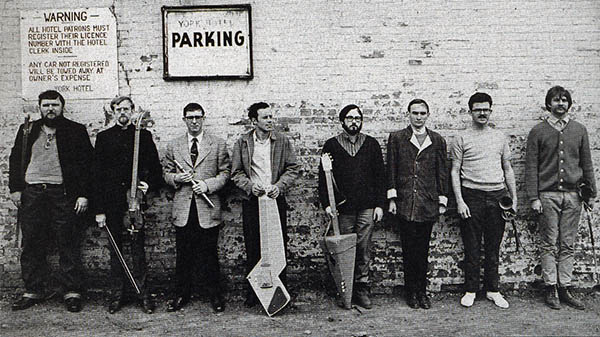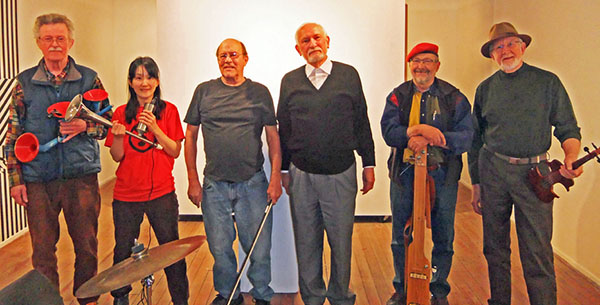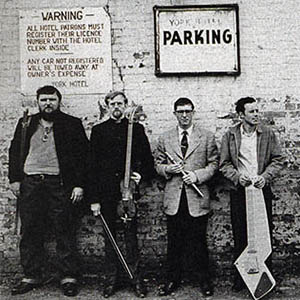
- The Nihilist Spasm Band
- (Photos by: Cameron McDonald [top] & Ian MacEachern [bottom])
- London, ON
- ::web/sounds::
From the old world of Kevin Hainey:
The Nihilist Spasm Band have been playing every Monday night in London, Ontario for 50 years, but you won’t find them receiving any star spangled celebrations on television for their lifetime achievements. This is because the NSB were the first band in Canada (and, as it’s generally accepted, the world) to consistently and intentionally play the hated music, the despised music, the music of torture, and the music of alienation: noise music. To this day, they continue to play that lovely noise the same way they always have - spasmodically, nihilistically, together as a band. It couldn’t be more appropriate that The NSB joined forces with their longtime collaborator, free jazz legend Joe McPhee, who joined them in a trio of shows in Toronto, London and Guelph: noise has always been the evil cousin of free jazz. You couldn’t find two more hated spawns of modern sound in a room of musical movements and genres than free jazz and noise rock. Not even uncle avant-garde could inspire so much reactionary despising. It could be said that the NSB has always thrived on negativity as much as realism and humility, but they’re not angry. “We were not angry in the ’60s and we are not angry now,” says Art Pratten, the NSB’s de facto spokesman and one of its founders. “We were all having a good time. The Nihilist Party we were members of took the party aspect very seriously.” Music historians are hard pressed to pin down other groups tapping similar musical veins as far back as 1965, and even early Canadian innovators such as multi-disciplinary artist Michael Snow and Toronto avant-garde group Intersystems were still a few years away from making their marks in sound at this early crest of the ’60s subcultural tidal wave. “We were all greatly influenced by kindergarten rhythm bands and Guy Lombardo,” admits Pratten, when I ask him what they were listening to at the time. The bleak, hopelessly disparate sounds of The NSB are not for the faint of heart. During their time, they’ve offended a lot of unsuspecting audiences with their heady cacophony and staunch nihilism. Pratten recalls one show in particular where concertgoers were driven into an angry uproar that got brought up onto the stage once the show had commenced. “Guelph, back in the late ’60s,” remembers Pratten. “We were booked as the final and professional act at Guelph University. Amateur Night.” On the other hand, there have been countless good times along the way. “Playing Europe for the first time in 1969. Playing Japan. Any of the No Music Festivals,” which the NSB organized in London. “Jamming with R.E.M.,” lists Pratten. Michael Stipe endorsements notwithstanding, the NSB have never let themselves become preoccupied with petty ideas of capitalist success. “If we have played this Monday and are going to play next Monday night, all is well,” says Pratten. “The NSB has a short attention span, so all we ever plan to do is play next Monday night and that has carried us for 50 years.”
Michael Stipe endorsements notwithstanding, the NSB have never let themselves become preoccupied with petty ideas of capitalist success. “If we have played this Monday and are going to play next Monday night, all is well,” says Pratten. “The NSB has a short attention span, so all we ever plan to do is play next Monday night and that has carried us for 50 years.”
Du vieux monde de Kevin Hainey: (Traduit par les convulsions linguistiques de Mathieu Bédard)
Le Nihilist Spasm Band joue chaque lundi soir à London (Ontario) depuis 50 ans; mais on ne les verra jamais participer à une cérémonie télévisée pour recevoir un prix – remis par une célébrité – en l’honneur de l’ensemble de leur carrière. Pourquoi? Parce que le NSB a été le premier groupe au Canada (et, d’après l’opinion générale, dans le monde) à jouer invariablement et intentionnellement cette musique de torture et d’aliénation haïe et méprisée qu’est la musique noise. À ce jour, ses membres continuent de jouer de ce doux bruit comme ils l’ont toujours fait : spasmodiquement, nihilistement et ensemble, en tant que groupe. Rien de plus approprié pour le NSB, donc, que d’allier ses forces à celles de son collaborateur de longue date, la légende du free jazz Joe McPhee, qui l’a rejoint pour un trio de concerts à Toronto, à London et à Guelph – le noise a toujours été le cousin démoniaque du free jazz. Vous ne pourriez trouver deux rejetons de la modernité sonore plus détestés dans le spectre des courants et des genres musicaux. Même tonton avant-garde ne pourrait inspirer autant d’aversion réactionnaire. Or, on pourrait dire que le NSB s’est toujours épanoui dans la négativité, au moins autant que dans l’humilité et le pragmatisme, toutefois ses membres ne sont pas en colère. « Nous n’étions pas fâchés dans les années 60 et nous ne le sommes toujours pas maintenant », déclare Art Pratten, un des fondateurs du NSB et son porte-parole de facto. « On se payait du bon temps. Le Parti nihiliste dont nous étions membres prenait le volet party très au sérieux. » En étudiant des groupes puisant dans une veine musicale similaire, les historiens de la musique peuvent difficilement remonter plus loin que 1965 – et à ce stade précoce du raz-de-marée sous-culturel des années 60, même les premiers innovateurs canadiens tels que l’artiste multidisciplinaire Michael Snow et le groupe d’avant-garde torontois Intersystems ne feraient leur marque sonore que quelques années plus tard. « Nous étions grandement influencés par les groupes rythmiques d’écoles maternelles et par Guy Lombardo », admet Pratten, lorsque je lui demande ce qu’ils écoutaient à l’époque. Les sons mornes et désespérément disparates du NSB ne sont pas pour les cœurs sensibles. À travers son histoire, il a offensé un grand nombre d’auditoires mal préparés avec son nihilisme fervent et cette cacophonie entêtante. Pratten se souvient d’un concert en particulier où, une fois le spectacle commencé, le public s’est transformé en un tollé furieux qui s’est rendu jusque sur la scène. Pratten se rappelle que c’était à « Guelph, à la fin des années 60. Nous étions engagés en tant que numéro final et professionnel pour clore la soirée amateur de l’Université Guelph. » D’un autre côté, il y a eu d’innombrables bons moments tout au long du chemin : « Jouer en Europe pour la première fois en 1969. Jouer au Japon. N’importe quel festival No Music, que le NSB organisait à London. Jammer avec R.E.M. », énumère Pratten. Malgré le soutien de Michael Stipe, le NSB n’a jamais été intéressé par l’insignifiante idée d’une réussite capitaliste. « Si on a joué ce lundi soir et qu’on jouera lundi prochain, tout va bien, affirme Pratten. Le NSB a une capacité d’attention courte, donc tout ce qu’on planifie, c’est de jouer le prochain lundi soir, et ça nous a porté pendant 50 ans. »
Malgré le soutien de Michael Stipe, le NSB n’a jamais été intéressé par l’insignifiante idée d’une réussite capitaliste. « Si on a joué ce lundi soir et qu’on jouera lundi prochain, tout va bien, affirme Pratten. Le NSB a une capacité d’attention courte, donc tout ce qu’on planifie, c’est de jouer le prochain lundi soir, et ça nous a porté pendant 50 ans. »
